|

|
|
The Birds (1963)
Rod Taylor plays Mitch Brenner in this classic Alfred Hitchcock thriller.
Taylor's performance -- often overlooked amid the flock of birds and
the fuss about Tippi Hedren -- is one of subtlety and strength. It covers
a range from the light romantic comedy and verbal jousting of the opening
scene to the fear and inner turmoil he must convey in the near-silent final
sequences.
ON THE SCREEN
Although the very title puts the birds in the forefront, the human relationships
stand at the center of this film. Because Hitchcock intentionally offers
no rational explanation for the bird attacks, he focuses our attention on
how people respond in such a trying situation.
So as suspense builds, we watch as the central characters -- Mitch, Melanie
(Tippi Hedren) and Mitch's widowed mother, Lydia (Jessica Tandy) -- cast
aside superficiality and preconceived notions, face their fears and eventually
bond under the most terrifying of circumstances.
As one author put it: "Life is a matter of beating off the birds,
and the only (partial) security is in the formation of deep relationships."
And as a fellow fan put it: "The story may seem to be about Melanie
Daniels, but it all depends upon Mitch Brenner."
Mitch definitely is the man in the middle of this movie. Before the "real"
bird attacks begin, there's a flock surrounding Mitch, all making demands
of him. There's his mother, fearful of abandonment; his sister, Cathy (Veronica
Cartwright), so much younger she could be his daughter; and his former girlfriend,
Annie (Suzanne Pleshette), who leads a lonely life in Bodega Bay just to
be near Mitch. And then Melanie migrates into this mix.
Mitch's relationship with Melanie starts as one of mutual provocation
and continues more or less along those lines until the horror truly sets
in. In the controlled "gilded cage" of the bird shop, they pose
and pretend, exchange flirtations and insults. Later, Mitch, the lawyer,
stands as inquisitor over Melanie in her car, parroting his mother's questions
and judgments. But following the bird attack at Cathy's birthday party and
the swarm of sparrows that invade the Brenner living room -- when all pretense
has been swept aside in the face of fear -- they share tender kisses and
sincere words of concern.
 Toward the movie's climax , as he boards up the house, the actor's physical
strength is obvious in his broad shoulders and back. This is a hallmark
of Taylor's abilities, because despite his rugged stature, he exudes tenderness.
The birds are massing, and Taylor's performance makes us feel the weariness
of a man gathering his resolve for one more battle. Toward the movie's climax , as he boards up the house, the actor's physical
strength is obvious in his broad shoulders and back. This is a hallmark
of Taylor's abilities, because despite his rugged stature, he exudes tenderness.
The birds are massing, and Taylor's performance makes us feel the weariness
of a man gathering his resolve for one more battle.
Just as we brace for the ultimate assault from the birds, it's an attack
from within the home -- when Lydia lashes out at her loyal son -- that shows
Taylor in his finest light and brings Mitch to the fore.
After peppering Mitch with questions, which he does his best to answer,
Lydia blurts out, "You don't know! When will you know? When we're all
dead? If only your father were here!"
 Mitch's face flickers with confusion and hurt. He tries to rally himself
from the emotional blow, but the unanswerable questions keep flying. And
when he finally takes a seat, the portrait of his father peers down over
his shoulder. Here, Taylor conveys the extreme discomfort of his character:
It's a rare moment that Mitch is not in motion, he's still stinging from
his mother's rebuke, and he suffers under the image of his father. It's
an uncomfortable few moments, but when the birds finally begin their assault,
Mitch takes charge again, leaping into action to secure windows and doors. Mitch's face flickers with confusion and hurt. He tries to rally himself
from the emotional blow, but the unanswerable questions keep flying. And
when he finally takes a seat, the portrait of his father peers down over
his shoulder. Here, Taylor conveys the extreme discomfort of his character:
It's a rare moment that Mitch is not in motion, he's still stinging from
his mother's rebuke, and he suffers under the image of his father. It's
an uncomfortable few moments, but when the birds finally begin their assault,
Mitch takes charge again, leaping into action to secure windows and doors.
Because "The Birds" is an achievement in special effects --
of both images and sound -- the carefully planned and choreographed final
scenes depend largely on the actors' convincing us that the danger is real.
Taylor deals with broad physical challenges as he's bloodied by pecking
birds, but he also deftly conveys fear, relief and love in silent, subtle
reactions -- often to objects that aren't really there.
BEHIND THE SCENES
"What separates a great director from a not-great
director is their vision. ... They can look at a thing and compose it as
well as Cezanne. Hitchcock would have his Cezannes around in sketch form.
Everything was planned. He was so extremely technical ... He was an architect,
rather than a wonderfully fluid painter."
-- Rod Taylor, April 17, 1997, Palm Beach
Post
The film is indeed a technical marvel. For two years before filming began,
scenes were meticulously planned and drawn in storyboard form. "The
Birds" features inventive effects, state-of-the-art filming techniques
and a groundbreaking soundtrack made up of simulated bird sounds rather
than a musical score.
For further quality, Hitchcock chose novelist Evan Hunter (aka Ed McBain)
to write the screenplay, as the director sought the critical respect that
had eluded his other films. The result of that decision keeps "The
Birds" from being "just" a horror movie or a special effects
showcase. In fact, Hunter explained that he and Hitchcock made the "decision
early on that we were never going to explain the bird attacks, never. Otherwise
the film would become science fiction and we didn't want to do that."
Hunter, however, notes three main ways the film differs from his screenplay:
An addition is the scene where Mitch and Melanie leave the children's
birthday party and go up into the dunes and discuss Melanie's empty life
and her lack of "a mother's love." Hunter recalls:
It's a stupid scene and I don't know who wrote it. Rod
Taylor said to me, "Evan, did you write this scene?" I read it
and I said, "No," and he said, "We're shooting it this morning."
... I went to Hitch and said, "This is a dumb scene, it's going to
slow down the movie enormously, slow down the point where the birds attack
the children at the birthday party, and it serves no purpose and I don't
think it should be in the movie." And he looked me dead in the eye
and he said, "Are you going to trust me or a two-bit actor?"
-- Writing
for Hitch: An Interview with Ed McBain
While we consider whether we forgive Hitch for that comment, let's look
at a pair of omitted scenes (which are detailed in "All
About The Birds," a comprehensive documentary included on the DVD
version of "The Birds"):

One scene was shot, but not included, and occurs the morning after the
first bird attack at the Brenner house. Mitch and Melanie continue their
verbal sparring, concoct a comical reason for the "bird rebellion"
and wind up in a passionate kiss. The scene would have formed a bridge between
the couple's previous antagonism and their affection in the next scene,
but it was discarded as "The Birds" reaches a turning point, when
terror is overtaking romance.
The other omission was not filmed and would have followed the Brenners
and Melanie as they drive through the devastated town and on toward one
final escape from a bird attack. That ending, Hunter explains, would have
made it "not just an isolated attack on Mitch and his family but a
town-wide attack with implications that it may have gone even beyond the
town."
But, with an ambiguous ending, "The Birds" stays true to itself
and Hitchcock leaves us with a deeply personal story of a specific group
of characters and their reactions to bizarre and terrifying circumstances. |
|

Click for Gallery
|
ROD ON BEING CAST
IN THE BIRDS |
|
"I don't know which of my films Hitch may have seen,
but he invited me to Universal to chat about 'The Birds.' He told me he
didn't want an elegant actor, like Cary Grant. He wanted someone with balls.
I didn't think we got on too well at that meeting. He was a strange man
to talk to, and he had very rigid ideas. But to my great surprise, he cast
me two days later."
-- Starlog, July 1986
|

The bird shop scene alone, for Rod Taylor to
strike that balance between arrogance and charm, with a point of
view regarding the law and society that was a bit quaint even in
1963, is quite an accomplishment.
-- Commentary by Ray Cunneff

And to just watch him once they're all boarded
up inside the house, the bird smashing through the window, the birds
coming through the front door... hardly a word spoken... just the
sound effects (that were used like music) and the actor... it's a
revelation.
-- Commentary by Ray Cunneff

Then there's his face when he opens the door and
looks out on the sea of birds... the crow that stabs at his hand...
the imagined safety of the garage... he makes you believe the
danger.
-- Commentary by Ray Cunneff

Rod is the center of gravity for the entire
film. His performance strikes just the right balance of strength and
inner conflict. Too much of one or the other and the whole picture
falls apart. His reactions to the birds are what make the terror
real and allow us to share it.
-- Commentary by Ray Cunneff
|